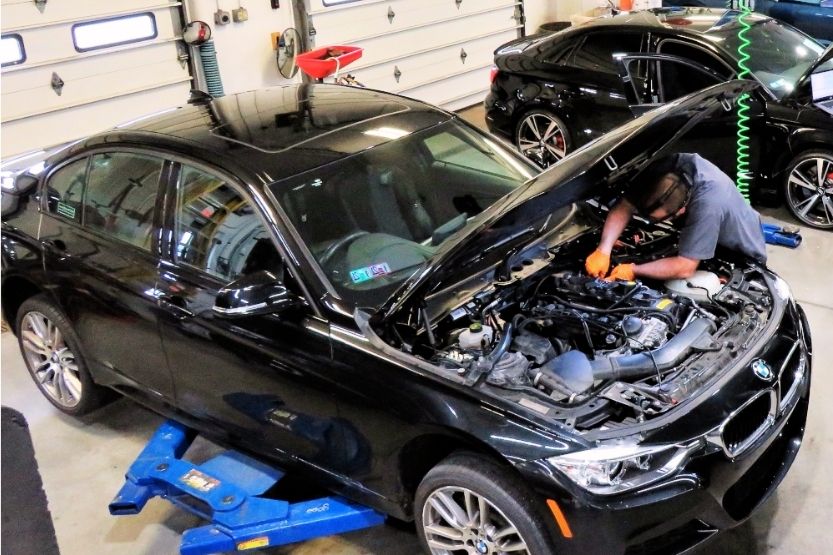BMWs are recognized and appreciated for their excellent quality, so they are expected to last long. But exactly how long is ‘long’? How long do BMWs last?
If you’re like most drivers and drive an average of 13,500 miles, a BMW could last a minimum of 10 – 15 years. A BMW can last 150-200,000 miles without trouble when properly maintained and cared for. But don’t be limited with this information as there have been many reports of BMW owners with 200,000+ miles on the clock without encountering any significant problems.
Of course, there are plenty of variables involved that influence a car’s longevity. Some of the main elements include a BMW’s model and specifications.
Read on to learn more about how long BMWs last, why they last long, and the models that last the longest.
What’s a BMW’s Average Life Expectancy?

With correct maintenance and proper care, one can expect a BMW to last for 150,000 to 200,000 miles or a minimum of 10 to 15 years. These two factors – maintenance and care – are the primary factors that affect any vehicle’s longevity.
Apart from regular maintenance, it should also be expected that common parts will be replaced as the car ages. These parts include the coolant system, battery, and electric windows, to name a few.
To expound more on this, here are more questions we know you want to know the answers to.
How Long Do BMWs Last in Years?
If a BMW is maintained well according to the brand’s service schedule, a BMW model can be expected to last for at least 15 years. Many owners report that their BMW has exceeded this length and reached the 20-year milestone, some even more.
Some drivers who claimed that their BMWs had hit the 20-year mark say they’re the sole driver of the vehicle and followed proper maintenance and care throughout the years. This shows that BMWs can exceed and perform with the right care for several decades.
How Long Do BMWs Last in Mileage?
Can Last Over 200,000 Miles or More with Proper Maintenance
A BMW can last over 200,000 miles or more with sufficient and proper maintenance. Some even clocked more than 300,000 miles, but the average mileage is 150 to 200,000 miles.
BMW Cars That Reach 300,000 Miles Is Rare
BMW cars that reach 300,000 miles may be rare, but it is a testament that BMWs are highly durable and arriving at this figure is possible for anybody.
Follow the Brand’s Recommended Maintenance Schedule
Follow the brand’s recommended maintenance schedule to maximize your BMW’s value.
You can even research and learn how to do small repairs and minor maintenance by yourself to save money. Some information can be found on YouTube or BMW forums.
Apart from saving financially, knowing how to do these and successfully doing maintenance yourself may also feel rewarding to you as the owner.
Are BMWs Reliable?
Manufactured Using High-level Craftsmanship
BMW models are manufactured using high-level craftsmanship and precision and incorporate excellent attention to detail. This formula provides results that require lesser repairs.
Consumer Report
In a 2020 Consumer Report on reliability study, BMW surpassed fellow brands such as Chrysler, Maserati, and Jeep. This study tested vehicles from the companies mentioned to determine the model with the highest mileage and the minor issues.
iSeeCars
iSeeCars included the BMW M6 in the top 10 list of the longest-lasting cars. A number of these cars are said to last over 200,000 miles.
J.D. Power
In the most recent industry-wide dependability study conducted by J.D. Power, BMW placed 11th, considered above the industry average.
In other words, if you were to put vehicles from Mercedes-Benz, Audi, and BMW head-to-head on the counts of reliability, the study showed that BMW easily surpassed its two rival German manufacturers.
Which BMW Models Are the Most Reliable?
Before we answer this question, let’s first lay the groundwork for what makes a vehicle reliable. Some factors that determine whether a car is reliable are the frequency of repairs, maintenance cost, and severity of the needed repairs.
When selecting reliable cars, a rule of thumb is to go with the simpler models. Why? Sophisticated parts tend to have issues more often than the essential parts.
Having said this, here are five BMW models that are deemed to be the most reliable:
1. BMW E90 330i (2006)
The E90 330i is recognized as the best-selling car in the three series and has sold over 335,232 units, making it one of the highest-selling luxury cars in the US. Moreover, the 3 Series was also awarded the Top Safety Pick in mid-size luxury cars in 2006.
This car is recommended for individuals searching for a sedan that provides the perfect mixture of performance and practicality with comfort and stability.
2. BMW F40 (2019)
The F40 carries a couple of recognitions under its hood. One of them is a 5-star overall rating on the Euro NCAP Test. Meaning it is safe for children, adults, and pedestrians and does so with flying colors.
The vehicle has also garnered BMW the title of the best producer of hatchbacks for several years now despite fierce competition from some of Mercedez’s A-class models.
Lastly, these compact hatchback series require minimal maintenance thanks to their simple overall design.
3. BMW i3 (2018)
The i3 is considered to be BMW’s first mass-produced zero-emission electric vehicle. Despite it being electric-powered, there have been no complaints regarding malfunctioning features.
It also received an overall rating of 8 out of 10 in Carwow’s robust testing. Expert reviewers have considered the vehicle’s reliability, performance, ease of handling, and safety.
If you fancy the idea of helping the planet while driving a great-performing car, the i3 could be your best bet.
4. BMW M4 (2016)
Apart from the tremendous power of the 3.0-liter twin-turbocharged V6, the M4’s low maintenance requirements make it reliable for both your wallet and driving needs.
84% of reviewers on Edmunds gave the sports car a rating of 5-stars, and some descriptives used by car owners include “best car ever,” “no regrets,” and “superb engine.” Let these reviews be a testament to its excellent reliability, handling, and performance.
Again, how long do BMWs last? A BMW can last around 150-200,000 miles or 10-15 years when you properly maintain it. There are reports of owners with a BMW with 200,000+ miles but do not experience major issues.
Which BMW Models Are the Least Reliable?

This list is based on the feedback given by owners via Consumer Reports and data on maintenance costs by Repair Pal. This information can give you an idea of most owners’ experiences and costs with these vehicles:
1. BMW X5 (2012-2014 & 2019)
According to Consumer Reports, the X5 has received the most complaints from all the BMWs. Consumers claim that this vehicle has had the highest-priced repairs they’ve ever experienced.
Some of the issues reported by owners include a stalling problem, water leaking from the roof’s drain tubes into the interior–ruining electronics, and transmission malfunctionings such as erratic shifting and the car switching into limp mode when the transmission fluid is low.
2. BMW X1 (2014)
Marketed as the smallest SUV offering from BMW in 2014, you would think that it’s designed to save you money from repairs and maintenance. However, reviews collected by Consumer Reports disagree, as the BMW X1 received the “Never Buy” label.
One of the better features of this vehicle, according to the reports, is its rear-wheel-drive offering despite its small crossover form factor. The X1 has the lowest annual maintenance cost among the SUVs in this list.
3. BMW X3 (2013, 2015, 2020)
Next up on the list is the X3. Similar to the BMW X5, the list provided by Consumer Reports includes a variety of model years for this vehicle: 2013, 2015, and 2020. It also shares the same engine options as the X5 and its reported issues.
According to Repair Pal, the X3’s annual maintenance cost fairs slightly lower than the X5 but still ranks as one of the more expensive costs in its category.
4. BMW 5 Series (2011 to 2013, 2018)
Consumer Reports have listed the sleek Sedan series from BMW as one of the models you shouldn’t buy, specifically the 2011-2013 and 2018 models.
If you haven’t noticed, these mentioned models overlap with the aforementioned X3 models above, so it is no surprise that they share several features and reported problems.
Repair Pal estimates these models’ annual repair and maintenance costs to be $977.
Common BMW Problems
As with any other car manufacturer brand, BMW has its problems. The problems that will be discussed aren’t necessarily worse than the next vehicle brand in the market, and it’s simply BMW’s unique set of reported issues, which ultimately every brand has:
1. Cooling System
The most common problem of a BMW that has been reported is overheating. This issue might involve many factors, such as a faulty water pump or a coolant leak. It is best to let a certified automotive technician inspect the vehicle to determine the cause correctly when this happens.
2. Faulty Tail Lamp
A message on your dashboard about “Check Rear Lamp/Brake Light” may be set off if your vehicle has a faulty tail lamp. This issue is usually caused by a bad bulb connection in the tail lamp circuit board, which in turn causes corrosion that triggers the malfunction indicator.
3. Oil Leaks
Some signs that your BMW has an oil leak are when you smell burning oil while you drive or if a tiny puddle of oil is commonly evident under your car. Although a few factors can cause this, a failing fuel pump or a leaky valve cover gasket is the most common one.
4. Steering Wheel Vibrates When Stepping on the Brakes
Ever experienced feeling your steering wheel shake or vibrate whenever you step on the brakes? Well, this issue is commonly reported in the BMW 3 Series.
This may indicate something wrong with one of your thrush arm bushings. These are essential components in your suspension systems and are known to fail around 75,000 miles.
If you are experiencing any of these issues, or any other problem, contact an automotive repair expert to alleviate the issue before it worsens.
How to Make BMW Vehicles Last Longer?

The average car owner isn’t adept in fixing or repairing their vehicles, which makes most people. But, ultimately, your car’s health and longevity lie in you – how you use it daily and how often you have it properly maintained by a professional.
This list is for the less car savvy, most car owners. It compiles some of the most essential and valuable techniques and tips for keeping your car looking and feeling new and making it last longer:
1. Keep Your Car Clean
Schedule a weekly car cleaning session to ensure your car doesn’t go for ages being dirty. Clean its interior and exterior to prevent dirt, stains, and other components from damaging components of your vehicle.
Moreover, having a clean car also contributes to a better mood and overall psychological state.
2. Drive Carefully
This should go without saying, but everyone needs reminding once in a while. Driving recklessly causes wear and tear to the car, no matter how new and durable.
Dashing through deep street holes and humps, accelerating and braking suddenly, and driving tight corners will result in higher repair bills and more frequent maintenance.
Driving responsibly also prevents accidents, which we all know are a burden to us physically, emotionally, and financially.
3. Load up Only on Clean Gas
Making sure the gas we put in our car is top-quality will significantly help extend its life. Dirty gasoline or watered-down products can cause significant damage to your vehicle in the long run. Hence, sticking with your trusted station or brand can save you a lot of heartaches.
4. Do Your Maintenance
Believe it or not, but to some extent, you can do your own car’s maintenance. How?
For example, with any leather interior component, such as seats, it is wise to clean them and apply the leather treatment on them once in a while to keep them from breaking and wearing out. You can also choose to cover them to prolong their pristine condition.
Another thing you can do is regularly wax your car, as this can keep rust at bay. You can also help your interiors last longer by parking in the shade, as the sun can cause overall damage to your car in the long run.
5. Follow the Recommended Maintenance Schedule
Throw out the old rule saying you should have your oil changed every three months or every 3,000 miles. This is an outdated rule and a very general one at that, and it doesn’t cater to the specific needs of your car model. Instead, you can find the correct info in the Owner’s Manual.
Go through the Owner’s Manual that comes with your car. It contains a wealth of information about best practices for taking care of your BMW, including an outlined detail of the maintenance schedule.
It also helps to check on your car regularly. Look for components that need replacing or cleaning, such as the front and backlights.
6. Buy Original Equipment Manufacturer (OEM) Parts
There will always come when you need to replace certain vehicle parts for car owners. You have to make sure that you buy the original version as aftermarket renditions are available when this happens. Better yet, buy the parts you need directly from BMW.
With this, you are sure that the equipment you buy will always provide the best fit and functionality, which could save you money from possible unmatching fit and function.
Conclusion – How Long Do BMWs Last?
So, how long do BMWs last? BMWs last up to 15 years or more and could rack up 250,000 miles (402, 336 km), depending on how you care for and treat your vehicle. They could even last up to 300,000 miles (482,803.2 km).
The total life expectancy for a particular BMW model varies, and one could last for decades, given that you know how to maintain and care for your vehicle.
BMW is recognized as one of the most preferred luxury car brands globally and with good reason. Even when treated mindlessly, these cars can last for a very long time, and imagine how long they will last when cared for properly.
Following some of the tips above can help your BMW last as long as possible, no matter its model.
Read next:


![Are BMWs Good Cars? [Reliability, Problems, Life Expectancy] are bmws good cars](https://roadsumo.com/wp-content/uploads/2022/04/are-BMWs-good-cars-150x150.jpg)

![Are BMWs Reliable? [What Are the Most Reliable BMW Models?] are bmws reliable](https://roadsumo.com/wp-content/uploads/2022/06/are-BMWs-reliable-150x150.jpg)




